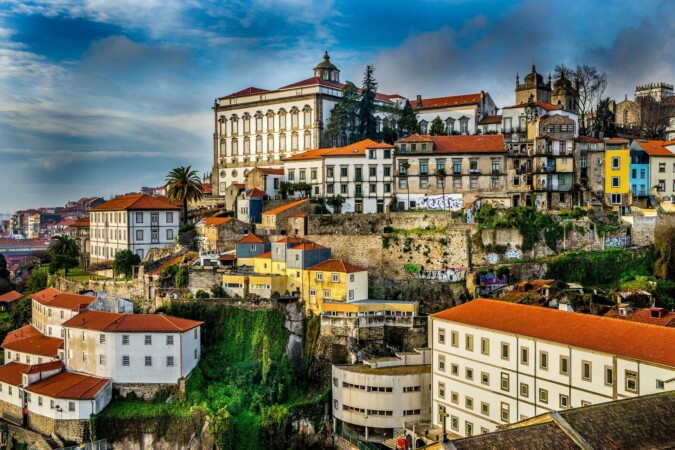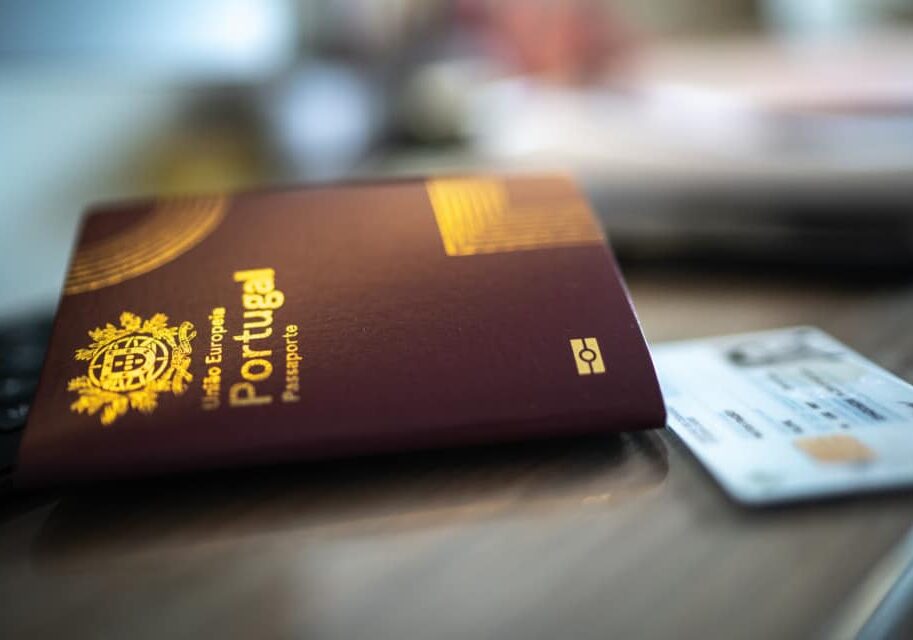Updated: May 22, 2024

Moving to Portugal and gaining Portuguese residency may seem a little complicated at first, particularly if you are not an EU national. For EU nationals, the process is pretty straightforward. For non-EU foreign nationals, you will need a residence permit to get residency in Portugal.
Different options are available depending on your situation, and you should ensure that you are well-informed on the most up-to-date information. You can consider various routes, notably the D7 Visa, Digital Nomad Visa, and the Golden Visa.
What is Portuguese residency?
With a high quality of life, low cost of living, a beautiful climate all year round, and specific tax incentives to lure in expats, many foreigners are looking to move to Portugal and obtain Portuguese residency. Factor in one of the best healthcare systems in Europe and excellent education opportunities; the list to move to Portugal goes on and on.
Portuguese residency means that you are legally allowed to live in Portugal. After five years as a Portuguese resident, you can apply to become a permanent resident and apply for citizenship (provided you meet the criteria).
Who should apply for Portuguese residency?
You should apply for Portuguese residency if you are looking to live, work or study in Portugal.
How do you get Portuguese residency as an EU national?
As a European Union (EU) national, given that it is free to live, work, and travel across the EU area, the process to get a Portuguese Residency is pretty straightforward.
You will not need a visa in the first three months to stay in Portugal. After this, you will need a document authorizing your residence in Portugal. All you will need to do is register at your local city hall (Câmara Municipal), which will issue a residence certificate that is valid for five years. Also, you will need to register with the Portuguese tax authorities. You will need to fulfill one of the following criteria:
- Be either employed or self-employed in Portuguese territory
- Have sufficient funds for yourself and family members (if applicable)
- Be enrolled at an officially accredited private or public teaching establishment and have enough funds for yourself and family members (if applicable)
Note that new tax residents in Portugal can enjoy tax advantages through the Non-Habitual Residence (NHR) Program, although the NHR program may be coming to an end in the near future.
Permanent residence in Portugal for EU nationals
After legally living in Portugal for over five years, EU citizens and their family members must apply for a registration certificate of permanent residence.
After scheduling an appointment, you must apply at AIMA for the certificate before the residence certificate expires. The cost will be €15 for the registration certificate of permanent residence.
How do you get Portuguese residency as a non-EU national?

Note that if you are staying for less than 90 days, some non-EU countries, such as the USA and UK, allow you to stay in the country visa-free for this time. Be sure to check your government’s website about traveling to Portugal to see if this is the case for you.
 D7 Visa
D7 Visa
If you are a non-EU citizen looking to move to Portugal with your funding, then the D7 Visa could be for you. This allows non-EU citizens to obtain Portuguese residency, provided they have sufficient means to support their stay in Portugal.
The visa is perfect for retirees and entrepreneurs alike who want to live in Portugal without having to make a significant financial investment. The visa is valid for two years and can then be renewed for a further three years. After this time, you can apply for permanent residence status and even citizenship.
D7 requirements:
In order to apply for this visa, you need to:
- Be a non-EU national
- Earn a passive income of at least €760 per month (your income can come from pensions, transferable equity, real estate, intellectual property, or financial equity)
- Show proof of a place to live in Portugal
- Be willing to reside for more than 183 consecutive days per calendar year in Portugal
There are two main steps to securing your D7 Visa:
- The first step is completed in your home country at a Portuguese Embassy. Simply present all the required documents, and if your application is approved, the embassy will deliver a temporary visa (valid for four months from the date of issue) permitting you to travel to Portugal, along with an appointment date with AIMA (Agency for Integration, Migrations, and Asylum) – previously SEF, the Portuguese Immigration and Border Service.
- You will need to attend your appointment with AIMI for the second step. Here, they will grant you an initial one-year period visa, which is renewable for two consecutive years. Note that in Lisbon and Porto, it will likely take longer to get an appointment with AIMI and may take up to 120 days.
Following this, you will have your vital D7 Visa, which allows you to reside in the country for five years, after which you will be able to apply for permanent residency and even citizenship.
 Digital Nomad Visa
Digital Nomad Visa
Portugal has recently launched its Digital Nomad Visa, which has made it possible for digital nomads to stay or work in Portugal for a specific time.
Remote workers can take this visa to apply for either a residency permit that can be renewed for up to five years or a temporary stay visa that has a maximum validity of one year. This makes it possible for remote employees who make four times the local minimum salary to live and work in Portugal.
 The Portugal Golden Visa
The Portugal Golden Visa

The ways to secure the Portuguese Golden Visa and the residency requirements vary depending on the investment route. Although, historically, the real estate investment pathway has been the most popular, this investment route is no longer open to investors, as per the new legislation that came into force on 7 October 2023. This includes both commercial and residential real estate.
The current investment options are outlined below:
- Contribute a minimum of €500,000 to a qualified investment fund subscription
- Make a donation of €250,000 or more towards the arts or the restoration of national heritage
- Contribute €500,000 or more to scientific research in the fields of Science or Technology
- Generate and sustain ten employment positions over a specified period
- Share capital and job creation: Incorporation of a company or reinforcement of a company’s share capital, in either case with an investment of €500,000, combined with the creation of five or maintaining ten jobs (five of them permanent) rephrase
The purchasing real estate investment option, along with the capital transfer option, is no longer eligible for the Golden Visa.
If you are interested in the Golden Visa Program, our residency and citizenship division, Global Citizen Solutions, would be happy to discuss your options with you. You can get in touch with them today.
If you are considering alternative routes for the Golden Visa, the investment funds option is an excellent option that has proved increasingly popular in recent years.
Other Pathways to Residency
Below are some other options to secure Portuguese residency.
 How to get Portuguese residency by marriage
How to get Portuguese residency by marriage
A person possessing a residence permit in Portugal or a Portuguese citizen is entitled to have their immediate family members join them in the country. This includes the spouse or life partner (referred to as “common law spouse”), dependent children, parents, or siblings of either spouse.
You can acquire Portuguese citizenship through marriage with a Portuguese citizen after three years of marriage or three years of cohabitation. For this, the applicant must provide the required documents that prove they have an adequate connection to the Portuguese community. However, there is no requirement for a prior period of residence in Portugal.
 How to get Portuguese residency by studying
How to get Portuguese residency by studying
Non-EU/EEA international students will need to apply for a Portuguese residence permit that is valid for one year. This is, in essence, a student visa. After this, the resident permit can be renewed for up to five years at an AIMA office.
Permanent Residence and Citizenship
There are several reasons why expats from across the world are moving to Portugal, whether it’s the high quality of life, pristine landscapes, bustling cities, or access to top-quality healthcare and education opportunities. Portugal is also one of the most affordable countries in Western Europe. However, if you have been living in Portugal for five years, you can apply for permanent residency and citizenship. Below, we delve into some of the benefits.
Benefits of Portuguese permanent residence and citizenship

- Participate in full Portuguese employment or self-employment (without the need for a work visa or work permit)
- Participate in education or study
- Access social security benefits, unemployment benefits, and pension
Additional benefits for Portuguese citizens alone include:
- Vote in elections and referendums
- Obtain a Portuguese passport, allowing you entry to 174 countries visa-free
- Acquire EU citizenship, allowing you to travel freely across EU member countries
- Live, work, or retire in other EU countries
How to obtain Portuguese permanent residency and citizenship
After five years of temporary residence, whether or not you are an EU national or a non-EU national, you will be able to register for a permanent residence permit in Portugal.
As with EU citizens, after five years as a temporary resident, you must apply for permanent residency. To apply for permanent residency, you will need to go to AIMA after scheduling an appointment. The cost is €15 and will need to be reviewed every five years.
For citizenship, you can also apply after five years of living in the country. For this, you will need to pass a language test and have a clean criminal record.
Portugal also allows dual citizenship, so you will not have to give up your home country’s nationality, provided your home nation also allows dual citizenship.
Speak With a Trusted Advisor
If you are considering moving to Portugal, knowing which Portuguese visa is the right one for your circumstances can be challenging. We recommend speaking with Goldcrest’s second residency and citizenship division, Global Citizen Solutions, who can answer any questions you may have concerning which visa program is right for you.
Frequently Asked Questions about How to Get a Portugal Residency
How to get Portugal residency?
If you are an EU citizen, you must register at your local city hall (Câmara Municipal) and the tax office. If you are a non-EU citizen, you must apply for a residency visa – such as the D7 Visa or the Golden Visa. However, there are several other options to obtain residency in Portugal for non-EU nationals.
What is the process of gaining Portuguese residency following Brexit?
If you are a UK citizen, you can stay visa-free in Portugal for 90 days. Following this, you will need a visa to stay in Portugal. The D7 Visa is a practical, popular Portuguese visa that allows you to live, work and retire in the country. The Golden Visa is a good option for investors, providing you with the pathway to get Portugal residency by investment. The Digital Nomad Visa is also an option for remote workers looking to move to Portugal.
How long does it take to obtain Portuguese citizenship?
After five years of living in Portugal, you can apply for citizenship. You will need to ensure that you meet all the requirements under Portuguese nationality law, such as having a clean criminal record and passing a language test.
How hard is it to get a permanent residence permit in Portugal?
It is not difficult to secure permanent residency or citizenship. However, you will need to have been a legal resident in Portugal for a set number of years. Once you’ve had a temporary residence permit in Portugal for five years, you can apply to obtain permanent residency and citizenship. There are several benefits to holding permanent residency or citizenship in Portugal.
How much does Portuguese residency cost?
With a Portugal residence permit by investment, you can enjoy all the privileges of status without settling permanently in Europe. The minimum investment to qualify for the Golden Visa program is €250,000. After five years of maintaining your residence, you can apply for a permanent resident permit and citizenship, provided you meet all the requirements under Portuguese nationality law.
What are the benefits of Portuguese residency?
If you have a Portuguese residence permit, you will be able to enjoy visa free travel to other countries in the EU/EEA, and Schengen countries. You will also be able to work in Portugal, having access to free education and the national health service. The Portuguese healthcare system is, by and large, excellent. You will also have a chance to become a Portuguese citizen after five years through naturalization.
How to get temporary residency in Portugal?
There are several ways to get temporary residency in Portugal, such as through study, work, or family reunification. Options to secure a temporary residence permit include the Digital Nomad Visa or a D7 Visa. After five years of residing in Portugal and renewing your visa accordingly, you can then apply for permanent residency and Portuguese citizenship, provided you meet all the requirements under Portuguese nationality law.
How to get residency in Portugal for EU citizens?
EU citizens should find it quite easy to secure residency in Portugal. You can stay in Portugal without a residency permit for three months. Following this, you must register at your local city hall (Câmara Municipal) and the tax office.
What are the Portugal immigration with zero investment requirements?
Individuals who would like to reside in Portugal without having to make an investment can opt for the Portugal D7 Visa, commonly known as a Passive Income Visa. The D7 Visa facilitates relocation to Portugal without the requirement of any financial obligations. Other options include the Digital Nomad Visa, which grants you residency provided you work for a foreign (non-Portuguese) company and earn four times the Portuguese minimum salary. Family reunification is also an option.
What are the Portugal temporary residence permit benefits?
Resident permit holders can enjoy various advantages, such as entry to the EEA/EU and Schengen Area without a visa. You will also be able to join the workforce and have unlimited access to education opportunities. After five years of legally residing in Portugal, you can apply for permanent residency in Portugal or citizenship.
How does obtaining permanent residency and citizenship in Portugal work?
After residing in Portugal for an extended period with a valid Portuguese residence permit, you become eligible to apply for Portuguese permanent residency and citizenship. Upon living with a temporary residence permit for five years, you can request permanent residence in Portugal, and you may apply for citizenship, providing you meet all the requirements under Portuguese nationality law, such as passing an A2 Portuguese language test.
How can I get a Portugal Work Visa?
For foreign nationals looking to get a Work Visa, they will need to be employed by a Portuguese company. Their employer will need to apply for a work permit from the Portuguese Labor Authorities.
Do I need a visa to enter Portugal?
Whether or not you require a visa to enter Portugal will depend on your country of origin. For foreign nationals, we strongly recommend checking carefully with your home country to determine whether you need a visa to enter Portugal.